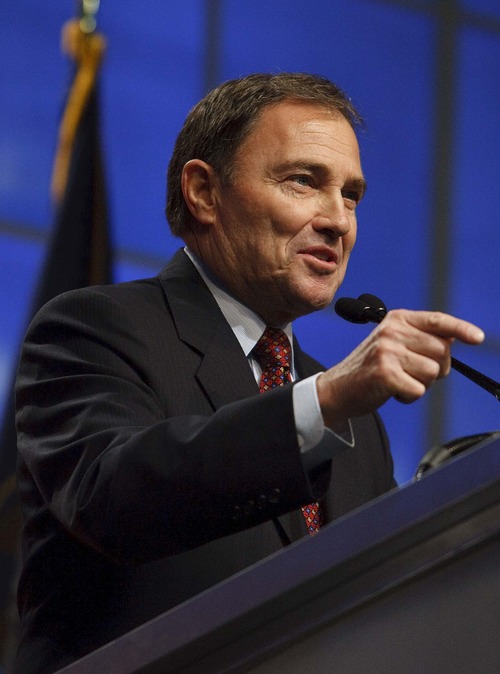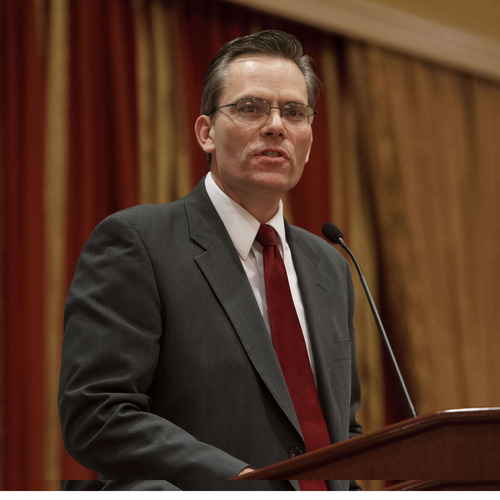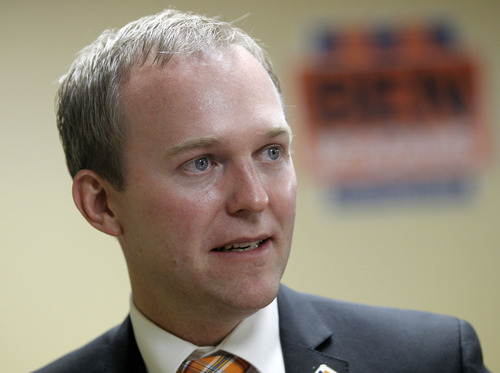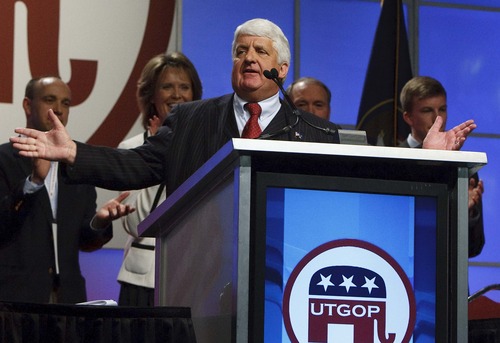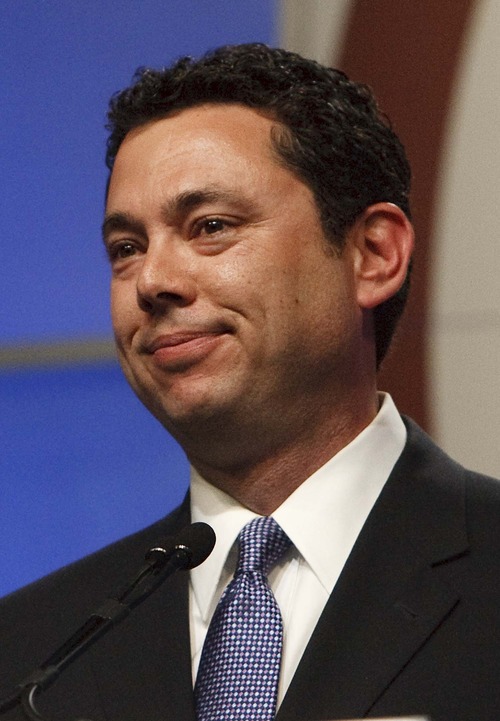This is an archived article that was published on sltrib.com in 2012, and information in the article may be outdated. It is provided only for personal research purposes and may not be reprinted.
Newly disclosed redistricting documents reveal Democratic Rep. Jim Matheson, if he holds onto his narrow election win, could owe thanks to some surprising and unwitting helpers: Republican Reps. Rob Bishop and Jason Chaffetz, and, perhaps, Gov. Gary Herbert.
Documents, and interviews, say Bishop and Chaffetz pushed GOP legislators to make their conservative districts even more safe — although Bishop disputes that — thus making other districts more competitive. It could have made the difference in the newly created 4th Congressional District, where Matheson holds a slim 2,646-vote lead over Republican Mia Love before the final tally, including late absentee and provisional ballots, is announced Tuesday.
"In their own self-interest, they would have loved to have 80 percent Republican districts and got 70 percent-plus ... They would have taken 90 percent," although no specific numeric benchmarks were discussed, GOP Rep. Ken Sumsion, House chairman of the Redistricting Committee, said in an interview about efforts by Chaffetz and Bishop.
Meanwhile, documents also suggest — as was alleged during redistricting — that some legislators felt Herbert was pushing to make congressional districts that would provide enough of a fighting chance for Matheson that he wouldn't decide to run against Herbert instead. Of course, Matheson did run for Congress —though in the new 4th District, rather than his redrawn 2nd District.
Those revelations emerge from the 16,000 pages of documents on redistricting that legislative leaders posted online Friday after a yearlong fight with Democrats over thousands of dollars in fees the Legislature attempted to charge.
Bishop, Chaffetz texts • Among the most interestingnuggets in the mass of records are cellphone texts from Bishop and Chaffetz aides to Sumsion, made Oct. 3, 2011, the first day of a special session on redistricting.
Scott Parker, Bishop's chief of staff, texted Sumsion about how he wanted more of heavily Republican Davis County in the 1st Congressional District. "Between us, you can imagine we're not fans of the line in Davis that far north — though I can understand the logic. But Rob is particularly feeling screwed w/ the process."
About the same time, Chaffetz aide Deidre Henderson texted Sumsion about some possible territory trades with districts where Matheson might run. "We'll take Carbon and Sevier [counties] in exchange for the extra 40,000 people you gave us in Salt Lake County. ... We'll keep that corner of Holladay, if you take some of Midvale to make the numbers work."
In an interview, Sumsion — who is leaving the Legislature after an unsuccessful run for governor — said the GOP congressmen "wanted as many conservative areas as they could get."
He said Bishop and allies fought plans that would have taken his new district intomore Democratic-leaning Salt Lake County. That ended up pulling Chaffetz's district more into that county, with concessions elsewhere. Sumsionsaid their efforts made their districts more safely Republican and the state's other two congressional districts a bit more competitive.
Parker disputed Sumsion's interpretation of the texts.
"I don't think Rob ever said, 'Give me a district as conservative as possible ...' " Parker said Monday. "I don't think Rob ever said, 'Don't put me in Salt Lake.' "
Parker said Bishop did oppose some proposals that had his district enter Salt Lake County not from the north via Davis County but from the east mountains near Millcreek.
"That didn't seem very defensible," he said.
Chaffetz did not respond Monday to inquiries about the texts from his office.
Utah Republican Party Chairman Thomas Wright said he sees nothing nefarious in the texts. He notes that Bishop was raised in Davis County and has long represented it, so the text from his aide simply shows "sometimes elected officials care about the areas they represent and would like to continue representing them."
Democratic response • "It's a little ugly seeing the sausage being made there," said Utah Democratic Party Chairman Jim Dabakis, adding Democrats fought to makethe records public preciselybecause such political jockeying might be revealed.
"We're seeing congressmen desperate to get as many Republicans into their districts to be as safe as possible," he said. "They are selfish. They are like piggies."
But the documents show some partisan mischief on the Democratic side, too — such as when Rep. Brian King, D-Salt Lake City, emailed party officials asking, "Are you planning on doing a partisan analysis of the six [final] congressional redistricting maps before our meeting tomorrow? That would be helpful."
Dabakis says partisan measuring of redistricting proposals should not surprise anyone by now.
"Let's not be shocked that politicians talked and fought about the political consequences of redistricting," Dabakis said, redirecting criticism to closed-door GOP caucuses. "That's where things were decided, and that's what's wrong."
The Democratic leader argues redistricting should be done by an independent commission with no vested interests in the outcome.
Sumsion also said it should be no surprise that partisan data found their way into the Legislature's redistricting calculations.
"Everybody was aware of that. It's part of the process."
But it's barely mentioned anywhere in the 16,000 pages released. On some rare occasions when it was raised, lawmakers warned others to stop it.
One example came in an email from Democratic Sen. Ben McAdams, now mayor-elect of Salt Lake County, to a group of Democratic lawyers discussing whether a lawsuit might be possible against Republicans over their closed-door caucuses.
"I suggest you remove me and any other legislators from this email chain if the subject matter relates to redistricting, potential litigation or other strategy," McAdams wrote. "Our correspondence on this matter, even on our personal email accounts, is arguably subject to public disclosure under GRAMA," the Government Records Access and Management Act.
Herbert veto threat? • Another rare allusion among the documents to behind-the-scenesarm-wrestlingis in an email from Sumsion to Derek Miller, the governor's chief of staff — which was previously disclosed in open-records requests by The Salt Lake Tribune and reported at the time.
Sumsion asks if the governor will veto plans that are short of his expectations "since Allie [Allyson Isom, then the spokeswoman for Herbert] alluded to it at the end of our meeting." That occurred just before Morgan Philpot — the Republican nominee against Matheson in 2010 — alleged publicly that Herbert was pushing to make a district friendly enough to entice Matheson into running again for Congress rather than making a bid for governor.
When that email was earlier disclosed, Isom denied that Herbert or his staff made any veto threats and said the governor simply stressed he wanted a mix of rural and urban areas in each congressional district. But Sumsion has said the tone used byaides seemed to imply a veto warning.
Internal GOP fight • Some communications in the newly released documents show lack of Republican Party support for a congressional redistricting plan drawn by Rep. Fred Cox, R-West Valley City, who just lost re-election. He emailed TheTribune about GOP effortsagainst his plan after reading some of those documents online over the weekend.
Cox wrote that Utah Republican Party Chairman Wright told him that, with his map, "Matheson would win. I said it was a good map and it would be a coin toss, but I didn't have any partisan numbers and didn't want them. He did. I told him I didn't care about his numbers and wasn't interested in them. I told him I didn't create the map to help either party. I thought the map was fair."
Wright disputed having such an exchange with Cox. He remembers that Cox tried to get him to endorse his map, but "I didn't like Fred's map for a variety of reasons. I don't think it was logical because it cut up many cities and towns and didn't keep areas of interest together."
As previously reported during redistricting, Wright confirmed to the press then that he warned lawmakers that his party would sue — similar to Democratic threats over what became final plans — if they passed Cox's map because he considered it gerrymandering to help Matheson.
Documents show — as revealed and reported by earlier document requests by Republicans — that Democrats worked jointly with supposedly independent "good government" groups to attack GOP plans. The new documents now add that Republicans complained in emails that such groups were Democratic fronts, but then discussed perhaps attempting something similar.
Stan Lockhart, the lobbyist husband of House Speaker Becky Lockhart, R-Provo, wrote a list of talking points for Republicans to use if their redistricting work was criticized, and included a strategy suggesting that "an 'unbiased' third party can make a big difference" in marshaling public support.


